Matthew Simmons
Matthew Simmons lives in Seattle.
Matthew Simmons lives in Seattle.

The last few years have seen two very good novels about office life, Joshua Ferris’s Then We Came to the End and Ed Park’s Personal Days. (Also, one very good British television program and one occasionally very good, David Foster Wallace-admiring American knock-off television program have appeared, too.)
If you have felt that all of those things have been lacking in a thick coat of misanthropy and violence—besides the thick coat of misanthropy and violence that some see as inherent to capitalism in the first place—Future Tense Publishing has just released a little chapbook called Our Beloved 26th that should satisfy your desires quite nicely.
I saw Kevin Sampsell yesterday*, and he handed me a copy of the book, and told me the author, Riley Michael Parker, is quiet and shy and young. Apparently—happily, really—the young man has some issues.
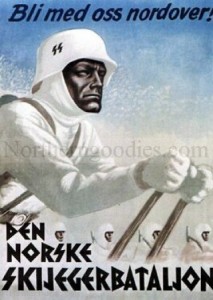
UbuWeb is the gift that keeps on giving.
Today’s stumbled upon wonderful thing? Benjamin Weismann reading “Hitler Ski Story.”
You should seek out Weismann’s book Headless, which appeared as part of Dennis Cooper’s Akashic books series Little House on the Bowery.
I like Weismann’s book. There are any number of quirky writers out there. Some are even not entirely bad. (Some are actually pretty good.) Weismann is not quirky. He’s not amusing. He’s not wry. He’s not gentle. He’s straight on absurd. The stories don’t just inhabit there own little worlds, parallel to our world. They tear our little world down, grab the necessary pieces, and burn the rest of the shit in a gigantic bonfire. You can actually smell the blaze on his fiction.
Here’s Weismann on Smokelong Quarterly.
Here’s an LA Times list.

Right now, my buddy Pasha Malla‘s gmail status say “BEST WEEK FRIGGIN’ EVER.” True enough.
Pasha’s first book, The Withdrawal Method, was for a time available up in a country called Canada from a publisher called Anansi. Any day now, said book will be available in a country called the United States of America from a publisher called Soft Skull.
He was longlisted for the Giller Prize.
It was also one of the Globe and Mail’s Top 100 Books of the year.
And now, Pasha’s book has been shortlisted for the Commonwealth Writers’ Prize in the Best First Book, Canada and the Caribbean category.
Cheers, Pasha.
Follow this link to read some stuff Pasha has written.
Here’s a favorite humor piece that appeared on McSweeney’s: THE BOMBAY PALACE ALL-YOU-CAN-EAT BUFFET: A POST COLONIAL PERSPECTIVE.

You know how in the future all the animals will be dead because of global warming or global climate change, and all our meat will be either human meat or meat grown in large vats? When all the animals will just be robots?
I want, when that happens, to replace the sound all the crickets make—all the crickets who live with me under my glass dome—to have their chirping sounds replaced with an endless loop of this recording of Aram Saroyan reading his poem “Crickets.”
If you are a person who can help me make this happen when the future arrives, please contact me now (giantblinditems at gmail dot com) so we can keep in touch. The future could sneak up on us.
Among my favorite works of minimalist art (the paintings of Agnes Martin, the sculptures of Donald Judd, the music of Steve Reich), there are the poems of Aram Saroyan. Follow this link to read some of his work.
Aram Saroyan pissed off Jesse Helms in seven letters. Clearly, he is an absolute good.
Funnily enough, on the subject of Minimalism, I don’t have much to say.
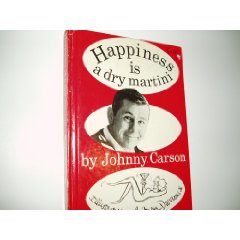
I didn’t really know Alan Dugan’s work until very recently, but was introduced to it through the I assume well known Love Song: I and Thou. It was a part of a lecture I attended, and the lecturer had a friend of mine stand up and read it at the very end of the lecture, the “Okay, thanks a lot,” moment. (The lecture was about irony. Or Irony, I suppose. An old subject, but certainly one worthy of discussion, as it tends to be so often misidentified.)
Since then, I’ve picked up Poems Seven, and have been enjoying it.
Dugan is a straight-ahead sort of writing, but he’s apparently also very formal. A fine combination.
Here’s my favorite:
READ MORE >
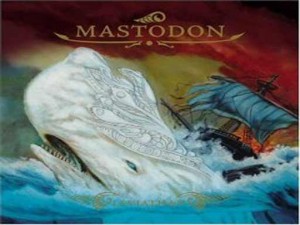
So, you know when you’re watching a fairly uninspired sitcom, or a middle of the road comedy film, there’s that scene where two straight guys end up having to share a bed for the night and, invariably, when they wake up the next day, one guy has his arm around the other and they are all cuddled up and then they both freak out and jump up and act masculine? Or one wakes up and the other is so completely out of it, he doesn’t, and the one who is awake has to try to get himself out of the situation somehow?
You know how you watch that scene and say: “Oh, yeah. This again.”
That scene? You know that scene, right?
Did you know Melville invented it?
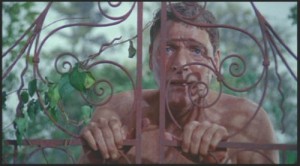
From the essay “Why I Write Short Stories,” which is collected in the Library of America’s upcoming John Cheever: Collected Stories and Other Writings:
To publish a definitive collection of short stories in one’s late 60s seems to me, as an American writer, a traditional and a dignified occasion, eclipsed in no way by the fact that a great many of the stories in my current collection were written in my underwear.
Another selection from the essay:
A collection of short stories appears like a lemon in the current fiction list, which is indeed a garden of love, erotic horseplay and lewd and ancient family history; but so long as we are possessed by experience that is distinguished by its intensity and its episodic nature, we will have the short story in our literature, and without a literature we will, of course, perish.
May you be correct, Cheever. The rest of this very short essay can be found here.
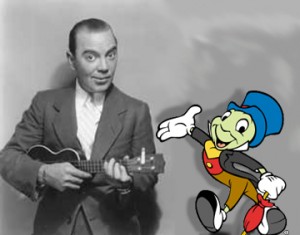
Here’s something else. Embedding of this youtube video has been disabled, so please follow this link. And then come back.
That was Cliff Edwards or “Ukulele Ike,” known to many of us as the voice of Disney’s Jiminy Cricket. As you can see, in addition to his career as a Vaudevillian, Edwards was also a World War I interrogator of German prisoners. In the video, we see him (and a fellow Imperialist American torturer slash tap dancer) engaged in some Abu Ghraib-style tactics, playing music that the subject clearly finds unbearable.
No doubt she moments later spilled all sorts of beans about the Kaiser’s plans, eh? Possibly she revealed the location of Wilhelm II mustache wax factory.
Literary tie-in: Cliff Edwards was born in Hannibal, Missouri. Also from Hannibal? Mark Twain, author of The Adventures of Huckleberry Finn, which is the GREAT AMERICAN NOVEL. Discuss.